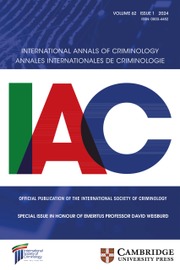The Cambridge Handbook of Digital Evidence in Criminal Investigations
Authored by leading scholars in the field, this handbook delves into the intricate matter of digital evidence collection, adopting a comparative and intra-disciplinary approach. It focuses specifically on the increasingly important role of online service providers in criminal investigations, which marks a new paradigm in the field of criminal law and criminal procedure, raising particular challenges and fundamental questions. This scholarly work facilitates a nuanced understanding of the multi-faceted and cross-cutting challenges inherent in the collection of digital evidence, as it navigates the contours of current and future solutions against the backdrop of ongoing European and international policy-making. As such, it constitutes an indispensable resource for scholars and practitioners alike, offering invaluable insights into the evolving landscape of digital evidence gathering.
- Provides an all-encompassing intra-disciplinary analysis of the challenges and solutions relating to the gathering of digital evidence
- Focuses on the increasingly important role service providers play when law enforcement authorities seek to obtain digital evidence in the context of criminal investigations
- Offers the reader a comprehensive comparison of national legal systems, in the EU and beyond
Product details
December 2024Adobe eBook Reader
9781009059404
0 pages
This ISBN is for an eBook version which is distributed on our behalf by a third party.
Table of Contents
- Introduction: gathering electronic evidence and cooperation with service providers in the digital era: a jigsaw puzzle of technological and legal challenges Vanessa FRANSSEN and Stanisław TOSZA
- Part I. Collecting Digital Evidence: Transversal Challenges and Solutions:
- 1. Impact of digital evidence gathering on the criminal justice system – A broader perspective Anže ERBEŽNIK
- 2. Unresolved jurisdictional issues in law enforcement access to data Dan SVANTESSON and Anna-Maria OSULA
- 3. Effective data protection and direct cooperation on digital evidence Gavin ROBINSON
- 4. On encryption technologies and potential solutions for lawful access Cyprien DELPECH DE SAINT GUILHEM
- 5. Admissibility of digital evidence Giulia LASAGNI
- 6. Exchange of data between national security agencies and law enforcement: challenges for criminal procedure Tatiana TROPINA
- 7. From mutual trust to the gordian knot of notifications. The e-Evidence regulation and directive Theodore CHRISTAKIS
- 8. Moving in the right direction for transborder access to digital evidence in criminal matters? The council of Europe and the second additional protocol introducing direct cooperation Angela AGUINALDO and Paul DE HERT
- Part II. Digital Evidence and the Cooperation of Service Providers in EU Criminal Investigations:
- 9. Digital evidence in criminal matters: Belgian pride and prejudice Sem CAREEL and Frank VERBRUGGEN
- 10. Digital evidence in Estonia Agnes KASPER, Eneli LAURITS and Melita SOGOMONJAN
- 11. Digital evidence and the cooperation of service providers in Germany Dominik BRODOWSKI
- 12. Accessing digital evidence in criminal matters: an inadequate Irish legal framework T. J. MCINTYRE and Maria Helen MURPHY
- 13. Digital evidence and the cooperation of service providers in Luxembourg Katalin LIGETI and Gavin ROBINSON
- 14. The gathering of digital evidence and cooperation of service providers in Poland Maciej ROGALSKI
- 15. Access to retained data and cooperation of service providers in criminal investigations in Spain Carmen CUADRADO SALINAS and Juan Carlos ORTIZ PRADILLO
- 16. Comparative analysis of National Law and Practices: unravelling differences in view of EU-wide solutions Stanisław TOSZA and Vanessa FRANSSEN
- Part III. Collecting Digital Evidence and the Role of Service Providers: A Global Perspective:
- 17. Digital evidence and cooperation of service providers in China Li ZHE and Jin ZHENAN
- 18. Cooperation of service providers in criminal investigations in the Russian Federation Maria FILATOVA, Olga KOSTYLEVA and Tatiana ALEKSEEVA
- 19. Digital evidence collection in Turkey Seçil BILGIҪ
- 20. Obtaining digital evidence under UK Law Elif Mendos KUŞKONMAZ and Ian WALDEN
- 21. Digital evidence gathering by US Authorities and Cross-Border cooperation with US-Based service providers Marine CORHAY and Vanessa FRANSSEN
- Conclusions: collecting digital evidence: from present challenges to future solutions Vanessa FRANSSEN and Stanisław TOSZA.





